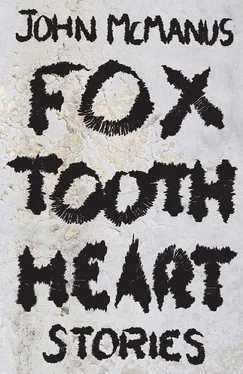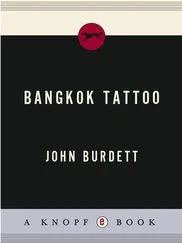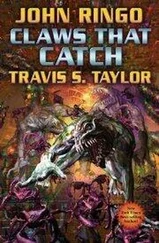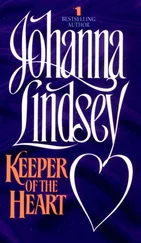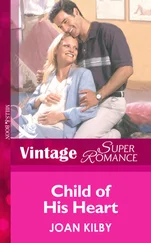“Chill out; let’s have fun. Have you done salvia?”
She got a pipe out and packed it with what looked like parsley. “It’s legal,” she said; “it makes you high for thirty seconds.”
With a finger she covered the carb. He pulled smoke in and inhaled. The highway narrowed and then faded away. It was dark now, and he was climbing the outer wall of a skyscraper, high above an abyss. He’d nearly reached the top, but his fingers didn’t have much glue left. Soon he was gripping for dear life in that frigid wind. Across the glass, inside, stood his parents and all the people he’d ever called his friends. Cozily warm, they chatted together by a fire. “Let me in,” he cried, but only a few even turned to watch him run out of glue and fall.
He came to in a world upside down: water for grass, dirt for sky, a herd of cattle dangling. Izzy’s vomit fell up, and then he got it; he had flipped the Porsche.
They crawled out through the windows and phoned Hank. While they waited, Caidin scraped off the vehicle ID. “Do you think God saved us?” Izzy asked.
He couldn’t tell if the question was sarcastic. “I think God was trying to kill us,” he said, except somehow neither he nor Izzy had suffered a scratch.
The next day he borrowed Astrid’s Volvo and went to school to find there weren’t seats for him in his classes. Some teachers didn’t know him. Worse was when the teachers who did asked no questions about where he’d been.
“Hey,” said Jeff in the lunch line.
“Sorry for skipping so much school.”
“You think it harmed me?”
“Jeff, come on.”
“Come on what, be your friend so I can die in a wreck?”
“How’d you hear about my wreck?”
“You had a wreck?”
“You said you’d heard.”
“Was it the Porsche?”
“I didn’t wreck. Screw you.”
After school, instead of returning the Volvo to Astrid’s, he took it home. “Where’s your brother’s car?” said his father, back from Dallas.
“My girlfriend’s got it. This is her car.”
“That’s who you’ve been spending so much time with?”
“Yeah, I think I really like her.”
“Good for you, kiddo. Good for you.”
He erased Astrid’s voicemail without listening to it. The next day, hoping to put things back on track, he drove to school in her car again. It was too late for the Ivy League, but in Texas the top ten percent of each class got into UT. Probably too late for that too, but he could try. On a precalculus test he scored a ninety.
“You skipped that unit, cheater,” Adam said afterward.
“I’d never cheat,” Caidin said, his feelings hurt. You’re jealous of how hot girls like me, he thought, running a hand through his long hair.
“There’s a new hurricane.”
“Hadn’t heard.”
“I doubt your new friends watch the news.”
At home that afternoon his parents had the weather on. The storm was a category three, named Rita. “This isn’t some Ninth Ward shack,” his mom said, but the next morning Rita had strengthened to four and it was time to leave. By midday, as school closed early, the roads were gridlocked. Ten minutes and Caidin hadn’t gone half a mile. The drivers seemed like a parade of idiots for moving so slowly. He tried something new: at every intersection, if traffic was bumper-to-bumper in one direction, he chose the empty way. Soon he was far from his house, on a street he realized led past Milo Hux’s neighborhood.
Knowing that they had gone, Caidin could allow a conversation with the Huxes to play out in his mind. He could even turn onto their street and drive to their gate. It was all my fault, he was telling Mr. and Mrs. Hux when he saw a man — no, a boy, tall and slender, with toffee-colored arms — standing in their front yard.
The speedometer didn’t stop at 120; it went all the way to 180, yet Caidin found himself braking, lowering the window, and saying, “What are you doing?”
“Looking for somebody,” said Juaco Luna, meeting Caidin’s eyes. He knows, Caidin thought.
“They moved to Montana, in the Rockies.”
“Yeah, I know where Montana is.”
“I mean, I don’t know the states of Honduras.”
“El Salvador. I grew up here.”
“Milo crashed his car and died.”
“Yep, that’s pretty much why they left town.”
Juaco’s lips seemed designed to look mired in a painful, constant memory, and Caidin longed to touch them.
“Why does everyone think you’re Honduran?”
“That was maybe just the guy who turned me in.”
Now his heart gulped blood the way his lungs gulped air. “Where’s the LeBaron?” he asked, hoping it wasn’t the car Milo had died in.
“Impounded.”
“I’ll drive you to pick it up.”
“I’ve heard how you drive,” Juaco said, but he got in.
Gripping the wheel to still his shaking arms, Caidin took them slowly forward. “Who told you about my driving?”
“Milo. He had a crush on you.”
“Give me a break,” Caidin said, but then he thought back on Milo’s gaze in the mirror. He remembered holding Milo underwater by the shoulders, pressing down with flat palms to maximize the amount of skin he touched. Maybe he’d have strangled the boy if it meant getting to touch him.
“Milo could be kind of a bitch,” Juaco said, putting a hand miraculously on Caidin’s leg. “I mean I get why you teased him.”
Caidin lifted his foot from the gas. On a leafy boulevard, the city skyline girding itself against roiling clouds ahead, they coasted to a halt. “Izzy Baxter says you’re coming back for her,” he said, trying to understand.
“Izzy’s cute, but she’s a total pothead.”
“Why were you living at Milo’s?”
“Yeah, his parents helped mine a long time ago,” said Juaco, leaning over the gear shift toward Caidin.
Juaco’s lips closed around Caidin’s lower lip. Their tongues touched. Already Caidin was dreading the end, wishing he could freeze time. He squeezed Juaco, pulling him closer. Juaco’s warm breath spread through him along every axon until he was trembling everywhere. Cars were passing; he didn’t care. He hoped they saw. It occurred to him that he was cheating on Astrid, and even that felt good.
A tractor trailer sped by, the wake shaking the two of them in tandem until Juaco sat upright and touched Caidin’s cheek. Only then did Caidin realize he was crying.
“You’re a good-looking guy,” Juaco said, drying his tear; “you’ll find someone.”
“I doubt I’ll live that long,” he said as he tried to get hold of himself.
“Don’t be dumb. Everyone hates high school.”
“You know there’s a big hurricane.”
Juaco nodded. “Yeah, I’ll find a ride out of town.”
“No, I’m taking you to your car,” Caidin said, moving forward again, but not for long; the impound lot turned out to be ten miles toward the coast, on a highway under contraflow.
Through a twisting labyrinth of oak-lined streets he found a back route home, where his dad was on a ladder nailing boards to the windows. In the kitchen his mom was throwing out food. “This is Juaco, and he’s spending the night,” Caidin told her.
She narrowed her eyes. “Is Juaco a common name?”
Caidin remembered the newsletter from back in the spring. “Geez, Mom, make your own friends, okay?”
“What zone are you in?” she asked their guest. The Maddoxes’ zone would depart in the morning.
“My parents already left,” Juaco said, as Caidin spoke over him: “He’s going tomorrow with his aunt.”
Leading Juaco upstairs, a finger hovering behind the small of Juaco’s back, Caidin rehearsed in his mind for the next kiss. In his bedroom, though, the mood seemed to have changed. Juaco sat down on the desk chair instead of the bed.
Читать дальше
